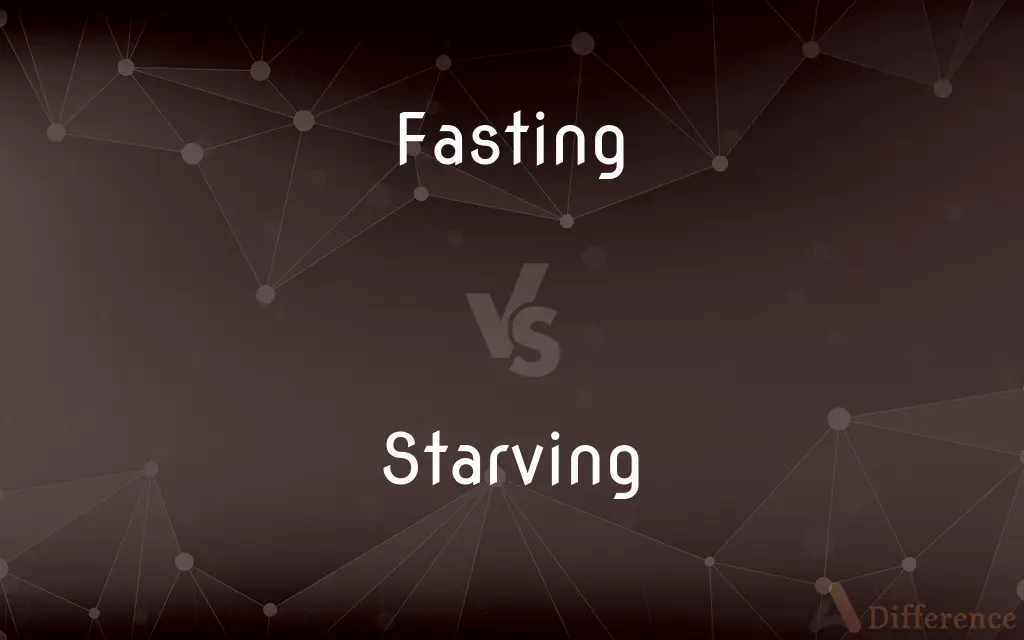Fasting vs. Starving — What's the Difference?
By Tayyaba Rehman — Updated on September 27, 2023
"Fasting" is the voluntary abstention from food for religious, health, or other reasons, while "Starving" is the severe suffering or death caused by lack of food.

Difference Between Fasting and Starving
Table of Contents
ADVERTISEMENT
Key Differences
Fasting is a deliberate and controlled act. It's a conscious decision to abstain from food, drink, or both for a certain period. Many people practice fasting for religious rituals, health regimens, or even protest actions. In many cultures and religions, fasting is seen as a way to purify the body and the mind, bringing spiritual benefits along with potential health advantages.
On the contrary, Starving indicates distress and suffering. It's not a choice, but rather a condition where an individual doesn't have access to enough food to meet their nutritional needs. Starving can lead to severe health consequences and can be fatal if prolonged. It's associated with malnutrition, weakness, and a decline in vital bodily functions.
Whereas fasting is often structured with a clear beginning and end, starving is an ongoing process without a defined timeline. The body, during fasting, knows when it will receive nourishment again. However, during starving, the body goes into survival mode, breaking down essential tissues and muscles to sustain itself.
Another distinction lies in the intent. Fasting is often seen in a positive light, with many believing it to have cleansing or spiritual benefits. On the other hand, starving is always negative, associated with poverty, famine, or neglect.
In summary, fasting and starving both relate to the lack of food, but the context, duration, intent, and outcomes are vastly different. While fasting is voluntary and can have potential benefits, starving is involuntary and always detrimental.
ADVERTISEMENT
Comparison Chart
Voluntariness
Voluntary
Involuntary
Reason
Spiritual, health, or protest
Lack of food access
Duration
Defined period
Indefinite
Outcome
Potential health or spiritual benefits
Malnutrition, health issues, death
Context
Religious, health regimens, protests
Poverty, famine, neglect
Compare with Definitions
Fasting
A deliberate choice for health or spiritual reasons
Fasting can detoxify the body.
Starving
Indicates a painful or prolonged hunger
She felt like she was starving after the long hike.
Fasting
Often has a structured start and end
His fasting will end at sunset.
Starving
Can lead to serious health issues
Starving individuals can suffer from malnutrition.
Fasting
Abstaining from food voluntarily
He is fasting for religious reasons.
Starving
Not a choice but a distressing state
The man was starving after being lost for days.
Fasting
An act that can be for a few hours to days
They are fasting for 24 hours.
Starving
Severe lack of essential nutrients
Many children in war zones are starving.
Fasting
A periodic abstinence from food
She practices intermittent fasting.
Starving
To suffer or die from extreme or prolonged lack of food.
Fasting
Fasting is the willful refrainment from eating and sometimes drinking (see Water fasting and Juice fasting). From a purely physiological context, "fasting" may refer to the metabolic status of a person who has not eaten overnight (see the "break fast"), or to the metabolic state achieved after complete digestion and absorption of a meal.
Starving
(Informal) To be hungry.
Fasting
To abstain from food.
Starving
To suffer from deprivation
A puppy starving for attention.
Fasting
To eat very little or abstain from certain foods, especially as a religious discipline.
Starving
(Archaic) To suffer or die from cold.
Fasting
The act or practice of abstaining from or eating very little food.
Starving
To cause to starve.
Fasting
A period of such abstention or self-denial.
Starving
To force to a specified state by starving
Starved the town into submission.
Fasting
Abstinence or mortification for religious reasons, especially abstinence from food.
Starving
Present participle of starve
Fasting
Abstinence from food, limiting caloric intake, for medical or health reasons, dieting.
Starving
Starvation
Fasting
Abstaining from food
Starving
The act of depriving of food or subjecting to famine;
The beseigers used starvation to induce surrender
They were charged with the starvation of children in their care
Starving
Suffering from lack of food
Starving
Often a result of poverty or neglect
The stray animals were starving and in need of care.
Common Curiosities
Is fasting safe for everyone?
Fasting may not be suitable for everyone, especially those with certain medical conditions.
Is fasting always related to religion?
No, fasting can also be for health reasons or protests.
How long can a person go without food before starving?
It varies, but after about 2 months, the risk of death from starvation increases.
Is intermittent fasting a type of starving?
No, intermittent fasting is a controlled abstention from food, not a state of malnutrition.
Can one drink water while fasting?
Some fasts allow water, while others don't. It depends on the type of fast.
Is it possible to be malnourished without starving?
Yes, malnourishment can occur even if one eats, if the diet lacks essential nutrients.
Can starving be a choice?
Starving is typically involuntary, indicating a distressing lack of food.
What happens to the body when starving?
The body breaks down fat, muscles, and tissues for energy, leading to malnutrition.
Can fasting help in weight loss?
Yes, many people practice fasting for its potential weight loss benefits.
Does starving always lead to death?
Not always, but prolonged starvation can be fatal.
Can fasting improve mental clarity?
Some believe fasting can boost mental clarity, though results can vary.
Is there a set time one should fast for health benefits?
There's no one-size-fits-all duration; it depends on the individual and the fasting type.
Are there different types of fasts?
Yes, there are various types, including intermittent fasting, water fasts, and juice fasts.
Are fasting and dieting the same?
No, fasting involves abstaining from food, while dieting is about regulated food intake.
Share Your Discovery

Previous Comparison
Concealer vs. Corrector
Next Comparison
Depredation vs. PredationAuthor Spotlight
Written by
Tayyaba RehmanTayyaba Rehman is a distinguished writer, currently serving as a primary contributor to askdifference.com. As a researcher in semantics and etymology, Tayyaba's passion for the complexity of languages and their distinctions has found a perfect home on the platform. Tayyaba delves into the intricacies of language, distinguishing between commonly confused words and phrases, thereby providing clarity for readers worldwide.















































